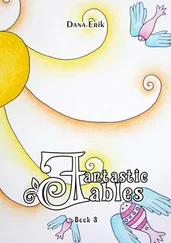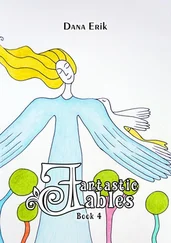Ambrose Bierce - Fantastic Fables
Здесь есть возможность читать онлайн «Ambrose Bierce - Fantastic Fables» весь текст электронной книги совершенно бесплатно (целиком полную версию без сокращений). В некоторых случаях можно слушать аудио, скачать через торрент в формате fb2 и присутствует краткое содержание. Жанр: Классическая проза, Юмористическая проза, на английском языке. Описание произведения, (предисловие) а так же отзывы посетителей доступны на портале библиотеки ЛибКат.
- Название:Fantastic Fables
- Автор:
- Жанр:
- Год:неизвестен
- ISBN:нет данных
- Рейтинг книги:5 / 5. Голосов: 1
-
Избранное:Добавить в избранное
- Отзывы:
-
Ваша оценка:
- 100
- 1
- 2
- 3
- 4
- 5
Fantastic Fables: краткое содержание, описание и аннотация
Предлагаем к чтению аннотацию, описание, краткое содержание или предисловие (зависит от того, что написал сам автор книги «Fantastic Fables»). Если вы не нашли необходимую информацию о книге — напишите в комментариях, мы постараемся отыскать её.
Fantastic Fables — читать онлайн бесплатно полную книгу (весь текст) целиком
Ниже представлен текст книги, разбитый по страницам. Система сохранения места последней прочитанной страницы, позволяет с удобством читать онлайн бесплатно книгу «Fantastic Fables», без необходимости каждый раз заново искать на чём Вы остановились. Поставьте закладку, и сможете в любой момент перейти на страницу, на которой закончили чтение.
Интервал:
Закладка:
Fantastic Fables
by Ambrose Bierce
The Moral Principle and the Material Interest . . .
A Moral Principle met a Material Interest on a bridge wide enough for but one.
“Down, you base thing!” thundered the Moral Principle, “and let me pass over you!”
The Material Interest merely looked in the other’s eyes without saying anything.
“Ah,” said the Moral Principle, hesitatingly, “let us draw lots to see which shall retire till the other has crossed.”
The Material Interest maintained an unbroken silence and an unwavering stare.
“In order to avoid a conflict,” the Moral Principle resumed, somewhat uneasily, “I shall myself lie down and let you walk over me.”
Then the Material Interest found a tongue, and by a strange coincidence it was its own tongue. “I don’t think you are very good walking,” it said. “I am a little particular about what I have underfoot. Suppose you get off into the water.”
It occurred that way.
The Crimson Candle
A man lying at the point of death called his wife to his bedside and said:
“I am about to leave you forever; give me, therefore, one last proof of your affection and fidelity, for, according to our holy religion, a married man seeking admittance at the gate of Heaven is required to swear that he has never defiled himself with an unworthy woman. In my desk you will find a crimson candle, which has been blessed by the High Priest and has a peculiar mystical significance. Swear to me that while it is in existence you will not remarry.”
The Woman swore and the Man died. At the funeral the Woman stood at the head of the bier, holding a lighted crimson candle till it was wasted entirely away.
The Blotted Escutcheon and the Soiled Ermine
A Blotted Escutcheon, rising to a question of privilege, said:
“Mr. Speaker, I wish to hurl back an allegation and explain that the spots upon me are the natural markings of one who is a direct descendant of the sun and a spotted fawn. They come of no accident of character, but inhere in the divine order and constitution of things.”
When the Blotted Escutcheon had resumed his seat a Soiled Ermine rose and said:
“Mr. Speaker, I have heard with profound attention and entire approval the explanation of the honourable member, and wish to offer a few remarks on my own behalf. I, too, have been foully calumniated by our ancient enemy, the Infamous Falsehood, and I wish to point out that I am made of the fur of the Mustela maculata , which is dirty from birth.”
The Ingenious Patriot
Having obtained an audience of the King an Ingenious Patriot pulled a paper from his pocket, saying:
“May it please your Majesty, I have here a formula for constructing armour-plating which no gun can pierce. If these plates are adopted in the Royal Navy our warships will be invulnerable, and therefore invincible. Here, also, are reports of your Majesty’s Ministers, attesting the value of the invention. I will part with my right in it for a million tumtums.”
After examining the papers, the King put them away and promised him an order on the Lord High Treasurer of the Extortion Department for a million tumtums.
“And here,” said the Ingenious Patriot, pulling another paper from another pocket, “are the working plans of a gun that I have invented, which will pierce that armour. Your Majesty’s Royal Brother, the Emperor of Bang, is anxious to purchase it, but loyalty to your Majesty’s throne and person constrains me to offer it first to your Majesty. The price is one million tumtums.”
Having received the promise of another check, he thrust his hand into still another pocket, remarking:
“The price of the irresistible gun would have been much greater, your Majesty, but for the fact that its missiles can be so effectively averted by my peculiar method of treating the armour plates with a new—”
The King signed to the Great Head Factotum to approach.
“Search this man,” he said, “and report how many pockets he has.”
“Forty-three, Sire,” said the Great Head Factotum, completing the scrutiny.
“May it please your Majesty,” cried the Ingenious Patriot, in terror, “one of them contains tobacco.”
“Hold him up by the ankles and shake him,” said the King; “then give him a check for forty-two million tumtums and put him to death. Let a decree issue declaring ingenuity a capital offence.”
Two Kings
The King of Madagao, being engaged in a dispute with the King of Bornegascar, wrote him as follows:
“Before proceeding further in this matter I demand the recall of your Minister from my capital.”
Greatly enraged by this impossible demand, the King of Bornegascar replied:
“I shall not recall my Minister. Moreover, if you do not immediately retract your demand I shall withdraw him!”
This threat so terrified the King of Madagao that in hastening to comply he fell over his own feet, breaking the Third Commandment.
An Officer and a Thug
A Chief of Police who had seen an Officer beating a Thug was very indignant, and said he must not do so any more on pain of dismissal.
“Don’t be too hard on me,” said the Officer, smiling; “I was beating him with a stuffed club.”
“Nevertheless,” persisted the Chief of Police, “it was a liberty that must have been very disagreeable, though it may not have hurt. Please do not repeat it.”
“But,” said the Officer, still smiling, “it was a stuffed Thug.”
In attempting to express his gratification, the Chief of Police thrust out his right hand with such violence that his skin was ruptured at the arm-pit and a stream of sawdust poured from the wound. He was a stuffed Chief of Police.
The Conscientious Official
While a Division Superintendent of a railway was attending closely to his business of placing obstructions on the track and tampering with the switches he received word that the President of the road was about to discharge him for incompetency.
“Good Heavens!” he cried; “there are more accidents on my division than on all the rest of the line.”
“The President is very particular,” said the Man who brought him the news; “he thinks the same loss of life might be effected with less damage to the company’s property.”
“Does he expect me to shoot passengers through the car windows?” exclaimed the indignant official, spiking a loose tie across the rails. “Does he take me for an assassin?”
How Leisure Came
A Man to Whom Time Was Money, and who was bolting his breakfast in order to catch a train, had leaned his newspaper against the sugar-bowl and was reading as he ate. In his haste and abstraction he stuck a pickle-fork into his right eye, and on removing the fork the eye came with it. In buying spectacles the needless outlay for the right lens soon reduced him to poverty, and the Man to Whom Time Was Money had to sustain life by fishing from the end of a wharf.
The Moral Sentiment
A Pugilist met the Moral Sentiment of the Community, who was carrying a hat-box. “What have you in the hat-box, my friend?” inquired the Pugilist.
“A new frown,” was the answer. “I am bringing it from the frownery—the one over there with the gilded steeple.”
“And what are you going to do with the nice new frown?” the Pugilist asked.
“Put down pugilism—if I have to wear it night and day,” said the Moral Sentiment of the Community, sternly.
“That‘s right,” said the Pugilist, “that is right, my good friend; if pugilism had been put down yesterday, I wouldn’t have this kind of Nose to-day. I had a rattling hot fight last evening with—”
Читать дальшеИнтервал:
Закладка:
Похожие книги на «Fantastic Fables»
Представляем Вашему вниманию похожие книги на «Fantastic Fables» списком для выбора. Мы отобрали схожую по названию и смыслу литературу в надежде предоставить читателям больше вариантов отыскать новые, интересные, ещё непрочитанные произведения.
Обсуждение, отзывы о книге «Fantastic Fables» и просто собственные мнения читателей. Оставьте ваши комментарии, напишите, что Вы думаете о произведении, его смысле или главных героях. Укажите что конкретно понравилось, а что нет, и почему Вы так считаете.






